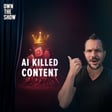
When Is It Worth Learning AI? A Conversation with Ashley Faus
In this episode of AI-Driven Marketer, Dan Sanchez sits down with Ashley Faus, the Head of Lifecycle Marketing at Atlassian, to dissect the current hype around AI and its future in the marketing world. They discuss whether AI will meet its lofty expectations, how it's being adopted in enterprise environments, and the balance between investing in AI and human resources. From using AI for daily tasks to addressing legal and ethical concerns in large organizations, Dan and Ashley cover a wide array of insightful topics. Expect a nuanced conversation about AI's role in job displacement, the necessity of human creativity, and the integration of AI into marketing strategies. Tune in to refine your understanding of AI’s potential impact in the marketing sector and beyond.
Timestamps:
00:00 Discussion on timing of enterprise AI adoption.
06:14 Early adoption crucial for competitive advantage, risky.
07:08 AI, digital natives and evolving computer interfaces.
12:58 Seeking Chat GPT solution for homeschool challenges.
15:03 Education system reinforces gender stereotypes, impacts mindset.
19:25 AI automates ticket summaries, aids in decision-making.
21:23 Writer struggles with AI-generated content limitations.
25:22 Early journey in conversation, content strategy essentials.
29:38 Embracing AI technology but still values humanity.
30:17 15 years of experience surpasses robot efficiency.
36:19 New grads meeting, AI-based onboarding, content suggestions.
38:30 Evaluating time investment for process efficiency.
43:23 Humans may no longer be needed for work.
44:15 Mind wandering, creativity, rethinking value of work.
47:18 Humans struggle to work themselves out of job.



![What’s Your Authority Score? [The 5-Factor Test] image](https://media.zencastr.com/cdn-cgi/image/width=112,quality=85/image-files/630c9f06819f8b3dba5fa460/cfbaccba-f587-45de-a41f-e2c99c15e2a5.png)
![The Audience Growth Engine [Full Framework] image](https://media.zencastr.com/cdn-cgi/image/width=112,quality=85/image-files/630c9f06819f8b3dba5fa460/46b84fd1-e856-4687-9aee-6b4a7e0bc7ff.png)



![The "Dream 100" Execution Plan [Google Sheet System] image](https://media.zencastr.com/cdn-cgi/image/width=112,quality=85/image-files/630c9f06819f8b3dba5fa460/fcd89374-76a4-4e58-a2e3-2bb7ddda4364.png)










